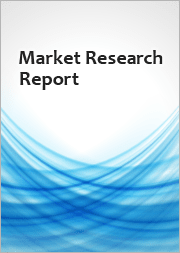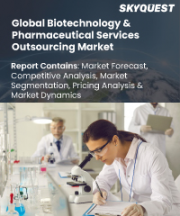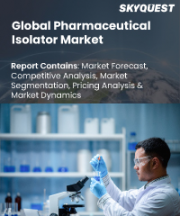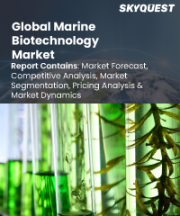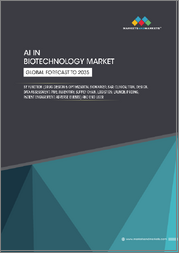
|
시장보고서
상품코드
1677243
생명공학분야 인공지능(AI) 시장(2025-2030년) : 컴포넌트, 기술, 조직 규모, 용도 분야, 최종 사용자, 배포 형태별 예측Artificial Intelligence in Biotechnology Market by Component, Technology, Organization Size, Application Area, End-User, Deployment Mode - Global Forecast 2025-2030 |
||||||
생명공학분야 인공지능(AI) 시장은 2024년 31억 8,000만 달러로 평가되었고 CAGR 16.17%로 성장하여 2025년에는 36억 5,000만 달러, 2030년에는 78억 2,000만 달러에 이를 것으로 예측되고 있습니다.
| 주요 시장 통계 | |
|---|---|
| 기준연도(2024) | 31억 8,000만 달러 |
| 추정연도(2025) | 36억 5,000만 달러 |
| 예측연도(2030) | 78억 2,000만 달러 |
| CAGR(%) | 16.17% |
인공지능(AI)은 생명공학분야의 변화의 핵심으로 급속히 상승하고 있습니다. 최근 AI를 탑재한 툴은 실험적인 기술에서 혁신의 필수적인 추진력으로 진화해 연구자와 기업도 마찬가지로 복잡한 생물학적 프로세스를 전례 없는 높은 정밀도로 연구할 수 있게 되었습니다. 이러한 기술과 생물학의 융합은 의약품 생산을 가속화하고 진단 정확도를 향상시킬 뿐만 아니라 연구 기법을 간소화하고 업무 효율성을 높입니다.
생명공학의 AI 혁명은 유전체학, 단백질체학, 임상 기록에서 얻은 엄청난 데이터 세트와 복잡한 알고리즘의 원활한 통합을 특징으로 합니다. 조직은 현재 첨단 머신러닝 모델과 딥러닝 기술을 활용하여 결과를 예측하고, 프로세스를 최적화하며, 수작업 조사에 의한 기존 장벽을 넓히고 있습니다. 업계가 진화함에 따라 의사결정자는 급속한 기술 진보로 이어지는 유망한 잠재력과 독특한 과제를 모두 다루어야 합니다. 이 보고서는 현재 상황을 자세히 조사하고 생명공학분야에서 R & D 및 상업화를 재정의하는 데 AI가 수행하는 매우 중요한 역할에 중점을 둡니다.
새로운 솔루션에 대한 지속적인 투자와 인공지능 기술의 적극적인 활용으로 이 분야는 임상과 운영의 패러다임에서 근본적인 변화를 보여줄 것입니다. 이러한 혁신의 새로운 시대를 극복하면서 AI와 생명공학의 효과적인 통합은 더 이상 옵션이 아니며 지속적인 성장과 경쟁 우위를 확보하기 위한 중요한 필수 사항임이 점점 밝혀지고 있습니다.
변화 : AI를 통한 생명공학 재정의
최근 몇 년 동안 생명공학을 둘러싼 환경은 AI의 발전으로 극적이고 혁신적인 변화를 겪고 있습니다. 기업과 연구기관은 기존의 방법에서 크게 벗어나 대규모 생물학적 데이터를 관리 및 해석하는 디지털 툴을 도입하고 있습니다. 인공지능의 역할은 의약품 제조과정의 가속화부터 임상적 의사결정의 강화까지 다양한 턴어라운드 시간과 환자 예후 개선을 가능하게 합니다.
이러한 혁신은 신경망, 컴퓨터 비전, 딥러닝, 로봇 프로세스 자동화와 같은 기술 혁신을 통해 생명공학기업의 분석 능력이 재정의된 알고리즘 접근 방식의 획기적인 변화로 인한 것입니다. 연구 개발에 AI를 도입함으로써 방대한 유전자, 분자, 임상 데이터를 실용적인 인사이트로 바꾸어 새로운 차원의 데이터 인텔리전스가 탄생합니다. 기술의 진화는 단순히 프로세스를 효율화할 뿐만 아니라 초기 단계 연구부터 사후 서비스 제공에 이르기까지 생명공학 사업의 청사진을 근본적으로 재현하고 있습니다.
또한 건강관리의 복잡한 과제에 대한 민첩성의 필요성이 AI 도입을 가속화하고 있습니다. 기업은 현재 예측 분석, 자동 진단 및 맞춤형 의료 전략을 지원하는 다면적 플랫폼을 통합하고 있습니다. AI가 진보할 때마다 비약적인 진보가 일어나고 과거에는 추측의 영역을 벗어나지 못하던 새로운 응용 분야나 패러다임에의 길이 열리고 있습니다. 이러한 전환은 경쟁 경계를 재정의하고 환자 관리, 조사 정확성 및 업계 전반의 효능을 변화시킬 잠재력을 갖춘 획기적인 진보의 무대를 마련하고 있습니다.
주요 부문에 대한 인사이트 : 시장 역학과 기회 파악
생명공학분야 AI 시장은 기술 및 업무 측면의 광범위한 측면을 반영하는 다차원적인 세분화 틀에 의해 해석됩니다. 컴포넌트 기반 분석을 통해 시장은 서비스와 솔루션이라는 두 가지 주요 부문에 걸쳐 조사되고 있습니다. 서비스에는 컨설팅, 구현, 사후 유지보수 서비스, 교육과 같은 전문적인 기능이 포함되어 있으며 솔루션 부문은 혁신적인 애플리케이션을 추진하는 플랫폼과 소프트웨어에 중점을 두고 분석됩니다.
기술적 측면에서 시장을 자세히 살펴보면 컴퓨터 비전, 딥러닝, 머신러닝, 자연언어처리, 신경망, 로봇 프로세스 자동화 등의 분야가 견조한 것을 알 수 있습니다. 이 기술적 다양성은 대기업의 역동적인 환경과 중소기업의 민첩한 운영을 구별하는 조직 규모 기반 세분화로 보완됩니다. 이러한 세분화는 또한 농업생명공학, 임상시험, 진단, 유전체 해석, 맞춤형 의료, 정밀의료, 연구 개발에서 AI 주도의 개선으로 인해 생명공학이 혜택을 받고 있는 응용 분야에 이르고 있습니다.
또한 농업기관, 생명공학기업, 의료제공자, 제약회사, 혁신의 선구자인 연구기관과 학술기관 등 최종 사용자 세분화를 조사함으로써 추가적인 인사이트가 드러납니다. 또한 배포 형태의 세분화는 클라우드, 하이브리드 및 온프레미스 솔루션의 전략적 중요성을 강조합니다. 이 종합적이고 미묘한 세분화의 틀은 시장 동향의 근본을 명확화할 뿐만 아니라 향후 투자와 협력의 기회가 높은 분야를 파악하는 데에도 도움이 됩니다.
목차
제1장 서문
제2장 조사 방법
제3장 주요 요약
제4장 시장 개요
제5장 시장 인사이트
- 시장 역학
- 성장 촉진요인
- 효율적인 생명공학 워크플로우 최적화를 위한 AI 구동 플랫폼의 채용 증가
- 유전체 데이터의 신속한 생성에 필요한 효율적인 데이터 관리 및 분석 AI
- 맞춤형 의료 수요 증가가 생명공학 연구실의 AI 통합 촉진
- 억제요인
- 생명공학 인프라에서 AI 시스템 구현 비용과 복잡성에 대한 우려
- 기회
- 임상시험 관리에 AI를 도입하여 환자의 모집과 시험의 효율성을 개선
- 건강에 영향을 주는 유전자 변이를 효율적으로 특정 및 분류하기 위한 AI 기술 도입
- 과제
- 데이터의 프라이버시를 확보하여 대량의 기밀성이 높은 생체분자 데이터를 안전하게 처리해야 함
- 성장 촉진요인
- 시장 세분화 분석
- 구성 요소 : 데이터 분석 개선을 위한 소프트웨어 솔루션의 선호도 증가
- 최종 사용자 : 농업 기관에서 생명공학분야 인공지능 채택 증가
- Porter's Five Forces 분석
- PESTEL 분석
- 정치
- 경제
- 사회
- 기술
- 법률
- 환경
제6장 생명공학분야 인공지능 시장 : 컴포넌트별
- 서비스
- 컨설팅
- 구현
- 사후 및 유지보수 서비스
- 교육 서비스
- 솔루션
- 플랫폼
- 소프트웨어
제7장 생명공학분야 인공지능 시장 : 기술별
- 컴퓨터 비전
- 딥러닝
- 머신러닝
- 자연언어처리
- 신경망
- 로봇 프로세스 자동화
제8장 생명공학분야 인공지능 시장 : 조직 규모별
- 대기업
- 중소기업
제9장 생명공학분야 인공지능시장 : 용도 분야별
- 농업생명공학
- 임상시험
- 진단
- 유전체 해석
- 맞춤형 의료
- 정밀의료
- 연구 개발
제10장 생명공학분야 인공지능 시장 : 최종 사용자별
- 농업연구소
- 생명공학기업
- 의료제공자
- 제약회사
- 연구 및 학술기관
제11장 생명공학분야 인공지능 시장 : 배포 형태별
- 클라우드
- 하이브리드
- 온프레미스
제12장 아메리카 생명공학분야 인공지능시장
- 아르헨티나
- 브라질
- 캐나다
- 멕시코
- 미국
제13장 아시아태평양의 생명공학분야 인공지능 시장
- 호주
- 중국
- 인도
- 인도네시아
- 일본
- 말레이시아
- 필리핀
- 싱가포르
- 한국
- 대만
- 태국
- 베트남
제14장 유럽, 중동 및 아프리카의 생명공학분야 인공지능 시장
- 덴마크
- 이집트
- 핀란드
- 프랑스
- 독일
- 이스라엘
- 이탈리아
- 네덜란드
- 나이지리아
- 노르웨이
- 폴란드
- 카타르
- 러시아
- 사우디아라비아
- 남아프리카
- 스페인
- 스웨덴
- 스위스
- 터키
- 아랍에미리트(UAE)
- 영국
제15장 경쟁 구도
- 시장 점유율 분석(2024)
- FPNV 포지셔닝 매트릭스(2024)
- 경쟁 시나리오 분석
- 전략 분석과 제안
기업 목록
- Atomwise, Inc.
- BenevolentAI, Ltd.
- BERG Health, LLC
- Cytel, Inc.
- CytoReason, Ltd.
- Deep Genomics, Inc.
- Envisagenics, Inc.
- Exscientia, plc
- Genialis, Inc.
- GNS Healthcare, Inc.
- Insitro, Inc.
- NuMedii, Inc.
- Owkin, Inc.
- PathAI, Inc.
- Recursion Pharmaceuticals, Inc.
- Tempus Labs, Inc.
- TwoXAR Pharmaceuticals, Inc.
- Valo Health, LLC
- Verge Genomics, Inc.
- Zymergen, Inc.
The Artificial Intelligence in Biotechnology Market was valued at USD 3.18 billion in 2024 and is projected to grow to USD 3.65 billion in 2025, with a CAGR of 16.17%, reaching USD 7.82 billion by 2030.
| KEY MARKET STATISTICS | |
|---|---|
| Base Year [2024] | USD 3.18 billion |
| Estimated Year [2025] | USD 3.65 billion |
| Forecast Year [2030] | USD 7.82 billion |
| CAGR (%) | 16.17% |
Artificial Intelligence (AI) is rapidly emerging as a cornerstone of transformative change in the biotechnology sector. In recent years, AI-powered tools have evolved from experimental technologies into essential drivers of innovation, enabling researchers and companies alike to explore complex biological processes with unprecedented precision. This fusion of technology and biology is not only accelerating drug discovery and improving diagnostic accuracy, but it is also streamlining research methodologies and enhancing operational efficiencies.
The AI revolution in biotechnology is marked by the seamless integration of complex algorithms with massive datasets derived from genomics, proteomics, and clinical records. Organizations now leverage advanced machine learning models and deep learning techniques to predict outcomes, optimize processes, and reduce the traditional barriers imposed by manual research. As the industry evolves, decision-makers must contend with both the exciting potential and the inherent challenges posed by rapid technological advancements. This report offers a detailed exploration of the current landscape, highlighting the pivotal role that AI plays in redefining research, development, and commercialization within the biotech realm.
Through continuous investment in new solutions and the proactive application of AI technologies, the sector is poised to witness radical shifts in both clinical and operational paradigms. As we navigate this new era of innovation, it becomes increasingly clear that the effective integration of AI and biotechnology is no longer optional but rather a critical imperative for sustained growth and competitive advantage.
Transformative Shifts: Redefining Biotechnology with AI
Over the past few years, the biotechnology landscape has undergone dramatic and transformative shifts driven by AI advancements. Companies and research institutions are seeing a significant departure from traditional methodologies, embracing digital tools that manage and interpret large-scale biological data. AI's role spans from accelerating drug discovery processes to enhancing clinical decision-making, enabling faster turnaround times and improved patient outcomes.
This transformation can be largely attributed to breakthroughs in algorithmic approaches, where innovations in neural networks, computer vision, deep learning, and robotic process automation have redefined the analytical capabilities of biotech firms. The infusion of AI into research and development unleashes new dimensions of data intelligence, turning vast repositories of genetic, molecular, and clinical data into actionable insights. The evolution in technology is not just making processes more efficient-it is fundamentally redrawing the blueprint of biotechnology operations, from early-stage research through to post-sales service delivery.
Furthermore, the need for agility in addressing complex challenges in healthcare has accelerated the adoption of AI. Companies are now integrating multifaceted platforms that support predictive analytics, automated diagnostics, and personalized medicine strategies. Each advancement with AI represents a leap forward, paving the way for novel application areas and paradigms that were once considered speculative. This shift is redefining competitive boundaries and setting the stage for groundbreaking advancements that have the potential to transform patient care, research accuracy, and overall industry efficacy.
Key Segmentation Insights: Decoding Market Dynamics and Opportunities
The market for AI in biotechnology is dissected through a multidimensional segmentation framework that reflects the broad spectrum of technological and operational dimensions. An analysis based on component reveals that the market is studied across two primary divisions: services and solutions. In this context, the services include specialized functions such as consulting, implementation, post-sales and maintenance services, and training and education, while the solutions segment is analyzed further with an emphasis on platforms and software that drive innovative applications.
A closer look at the market through the lens of technology indicates a robust performance in areas including computer vision, deep learning, machine learning, natural language processing, neural networks, and robotic process automation. This technological diversity is complemented by segmentation based on organization size, which distinguishes between the dynamic environment of large enterprises and the agile operations of small and medium enterprises. Such segmentation further extends to application areas where biotechnology is benefiting from AI-driven improvements in agricultural biotechnology, clinical trials, diagnostics, genomics analysis, personalized medicine, precision medicine, and research and development.
Additional insights are uncovered by examining the end-user segmentation, which spans agricultural institutes, biotechnology firms, healthcare providers, pharmaceutical companies, as well as research and academic institutions that are pioneering innovation. Moreover, the deployment mode segmentation highlights the strategic importance of cloud, hybrid, and on-premises solutions. This comprehensive and nuanced segmentation framework not only elucidates underlying market trends but also helps identify areas ripe for future investment and collaboration.
Based on Component, market is studied across Services and Solutions. The Services is further studied across Consulting, Implementation, Post-Sales & Maintenance Services, and Training & Education Services. The Solutions is further studied across Platform and Software.
Based on Technology, market is studied across Computer Vision, Deep Learning, Machine Learning, Natural Language Processing, Neural Networks, and Robotic Process Automation.
Based on Organization Size, market is studied across Large Enterprises and Small & Medium Enterprises.
Based on Application Area, market is studied across Agriculture Biotechnology, Clinical Trials, Diagnostics, Genomics Analysis, Personalized Medicine, Precision Medicine, and Research & Development.
Based on End-User, market is studied across Agricultural Institutes, Biotechnology Firms, Healthcare Providers, Pharmaceutical Companies, and Research & Academic Institutions.
Based on Deployment Mode, market is studied across Cloud, Hybrid, and On-Premises.
Regional Dynamics: Spotlight on Americas, EMEA, and Asia-Pacific Markets
Regional trends play a pivotal role in shaping the landscape of AI in biotechnology. Across the Americas, innovation is driven by a mature ecosystem of research institutions and an active venture capital presence that collectively foster rapid technological adoption. Robust regulatory frameworks and intensive investments in health technology further bolster the integration of AI into biological research and healthcare applications.
The region encompassing Europe, the Middle East, and Africa (EMEA) is also witnessing significant momentum. Here, the collaborative focus on public-private partnerships and comprehensive policy initiatives supports a broad array of research and development activities, facilitating the deployment of AI solutions. Initiatives in these regions embrace a fusion of historical expertise and cutting-edge technology, thereby enabling a proactive response to both clinical and agricultural challenges.
In the Asia-Pacific region, the explosive growth of digital health innovations coupled with increased healthcare infrastructure investments is carving out a distinct competitive edge. This region is rapidly becoming a hub for technological advancements and research-driven collaborations, as governments and private players invest heavily in modernizing their biotechnology sectors. Collectively, these regional insights illustrate the varying degrees of maturity and potential across global markets, underscoring the importance of a tailored approach to capitalizing on regional strengths and addressing local challenges.
Based on Region, market is studied across Americas, Asia-Pacific, and Europe, Middle East & Africa. The Americas is further studied across Argentina, Brazil, Canada, Mexico, and United States. The United States is further studied across California, Florida, Illinois, New York, Ohio, Pennsylvania, and Texas. The Asia-Pacific is further studied across Australia, China, India, Indonesia, Japan, Malaysia, Philippines, Singapore, South Korea, Taiwan, Thailand, and Vietnam. The Europe, Middle East & Africa is further studied across Denmark, Egypt, Finland, France, Germany, Israel, Italy, Netherlands, Nigeria, Norway, Poland, Qatar, Russia, Saudi Arabia, South Africa, Spain, Sweden, Switzerland, Turkey, United Arab Emirates, and United Kingdom.
Industry Leaders Shaping AI-Driven Biotechnology Innovation
A host of pioneering companies are at the forefront of leveraging AI to revolutionize biotechnology. Among these, notable innovators include Atomwise, Inc., which utilizes sophisticated algorithms for drug discovery, and BenevolentAI, Ltd., known for its groundbreaking approaches in harnessing big data. BERG Health, LLC has made significant strides in integrating AI with metabolic insights, while Cytel, Inc. and CytoReason, Ltd. are focusing on refining the analytics and modeling aspects of clinical trials.
Deep Genomics, Inc. and Envisagenics, Inc. are recognized for their contributions to genomics analysis and biomarker discovery, and Exscientia, plc is redefining drug design through precise algorithmic modeling. Genialis, Inc. and GNS Healthcare, Inc. continue to set the benchmark for computational tools that drive personalized healthcare solutions. Equally influential are Insitro, Inc. and NuMedii, Inc., whose innovative approaches are accelerating the roadmap toward precision medicine through the integration of AI in research.
Other key players such as Owkin, Inc., PathAI, Inc., and Recursion Pharmaceuticals, Inc. are expanding the capabilities of AI in diagnostics and treatment optimization. Tempus Labs, Inc. and TwoXAR Pharmaceuticals, Inc. stand out for their adept use of AI in clinical research, while Valo Health, LLC, Verge Genomics, Inc., and Zymergen, Inc. have successfully blended innovative technological platforms with traditional biotechnological processes. These companies not only exemplify leadership in their respective niches but also reflect the dynamic, competitive landscape that is increasingly driven by AI-centric innovations.
The report delves into recent significant developments in the Artificial Intelligence in Biotechnology Market, highlighting leading vendors and their innovative profiles. These include Atomwise, Inc., BenevolentAI, Ltd., BERG Health, LLC, Cytel, Inc., CytoReason, Ltd., Deep Genomics, Inc., Envisagenics, Inc., Exscientia, plc, Genialis, Inc., GNS Healthcare, Inc., Insitro, Inc., NuMedii, Inc., Owkin, Inc., PathAI, Inc., Recursion Pharmaceuticals, Inc., Tempus Labs, Inc., TwoXAR Pharmaceuticals, Inc., Valo Health, LLC, Verge Genomics, Inc., and Zymergen, Inc.. Strategic Action Plan: Recommendations for a Competitive Edge
For those seeking to secure a position at the forefront of biotechnology innovation, it is imperative to conceive a strategic action plan grounded in actionable insights and clear objectives. Industry leaders are encouraged to invest robustly in emerging AI technologies, prioritizing the enhancement of research and operational capacities. Strategic partnerships and collaborations with technology providers can further accelerate the adoption of sophisticated AI models, ensuring that organizations remain agile in a highly competitive market.
Further expansion should involve the integration of scalable digital platforms that can harness the full potential of data analytics. Embracing cloud, hybrid, or on-premises solutions depending on organizational needs ensures resilience and customized performance. Proactivity in adopting comprehensive training and education programs is crucial; these initiatives not only elevate internal capabilities but also facilitate smoother transitions during the digital transformation journey.
Organizations must also focus on developing a responsive and adaptive corporate culture that readily embraces change. This involves nurturing a cross-disciplinary workforce that can bridge traditional biotechnology expertise with advanced computational techniques. Monitoring and adapting to regulatory developments is equally vital, helping to mitigate potential compliance challenges while capitalizing on emerging market opportunities. Ultimately, a well-orchestrated strategy will enable firms to harness AI's transformative power, driving both innovation and sustainable competitive advantage.
Conclusion: Advancing Biotechnology Through AI Excellence
In summary, the fusion of artificial intelligence with biotechnology is catalyzing a paradigm shift that promises to redefine research methodologies, clinical practices, and overall operational frameworks in the industry. The insights derived from detailed segmentation and regional analysis underscore the multifaceted benefits of integrating sophisticated AI solutions across all layers of operation. The ever-expanding capabilities of technologies such as deep learning, neural networks, and robotic process automation continue to propel the industry forward, delivering robust improvements in efficacy, accuracy, and speed.
As the market evolves, the strategic alignment between technological innovation and biotechnological expertise becomes increasingly critical. Organizations now face a competitive landscape that rewards agility, foresight, and strategic investment in state-of-the-art AI-driven tools. By embracing these insights and integrating best practices, industry players can foster an environment ripe for innovation and sustainable advancement. The continuous evolution of AI technologies represents not just a trend, but a fundamental shift in the way biotechnology will operate in the years to come.
The strategic synthesis of technology and tradition offers organizations a unique opportunity to redefine their operations and achieve new heights in research and clinical excellence. This transformation, marked by a relentless pursuit of innovation, will undoubtedly carve the path to breakthroughs that have the potential to save lives and elevate global health standards.
Table of Contents
1. Preface
- 1.1. Objectives of the Study
- 1.2. Market Segmentation & Coverage
- 1.3. Years Considered for the Study
- 1.4. Currency & Pricing
- 1.5. Language
- 1.6. Stakeholders
2. Research Methodology
- 2.1. Define: Research Objective
- 2.2. Determine: Research Design
- 2.3. Prepare: Research Instrument
- 2.4. Collect: Data Source
- 2.5. Analyze: Data Interpretation
- 2.6. Formulate: Data Verification
- 2.7. Publish: Research Report
- 2.8. Repeat: Report Update
3. Executive Summary
4. Market Overview
5. Market Insights
- 5.1. Market Dynamics
- 5.1.1. Drivers
- 5.1.1.1. Increased adoption of AI-driven platforms for efficient biotech workflow optimization
- 5.1.1.2. Rapid genomics data generation necessitating AI for efficient data management and analysis
- 5.1.1.3. Increasing demand for personalized medicine fueling AI integration in biotechnology labs
- 5.1.2. Restraints
- 5.1.2.1. Cost and complexity concerns in implementing AI systems within biotech infrastructures
- 5.1.3. Opportunities
- 5.1.3.1. Deploying AI in clinical trial management to improve patient recruitment and trial efficiency
- 5.1.3.2. Introducing AI technologies for efficient identification and classification of genetic mutations impacting health
- 5.1.4. Challenges
- 5.1.4.1. Ensuring data privacy and handling significant amounts of sensitive biomolecular data securely
- 5.1.1. Drivers
- 5.2. Market Segmentation Analysis
- 5.2.1. Component: Rising preference of software solutions for improved data analytics
- 5.2.2. End-User: Increased adoption of artificial intelligence in biotechnology in agricultural institutes
- 5.3. Porter's Five Forces Analysis
- 5.3.1. Threat of New Entrants
- 5.3.2. Threat of Substitutes
- 5.3.3. Bargaining Power of Customers
- 5.3.4. Bargaining Power of Suppliers
- 5.3.5. Industry Rivalry
- 5.4. PESTLE Analysis
- 5.4.1. Political
- 5.4.2. Economic
- 5.4.3. Social
- 5.4.4. Technological
- 5.4.5. Legal
- 5.4.6. Environmental
6. Artificial Intelligence in Biotechnology Market, by Component
- 6.1. Introduction
- 6.2. Services
- 6.2.1. Consulting
- 6.2.2. Implementation
- 6.2.3. Post-Sales & Maintenance Services
- 6.2.4. Training & Education Services
- 6.3. Solutions
- 6.3.1. Platform
- 6.3.2. Software
7. Artificial Intelligence in Biotechnology Market, by Technology
- 7.1. Introduction
- 7.2. Computer Vision
- 7.3. Deep Learning
- 7.4. Machine Learning
- 7.5. Natural Language Processing
- 7.6. Neural Networks
- 7.7. Robotic Process Automation
8. Artificial Intelligence in Biotechnology Market, by Organization Size
- 8.1. Introduction
- 8.2. Large Enterprises
- 8.3. Small & Medium Enterprises
9. Artificial Intelligence in Biotechnology Market, by Application Area
- 9.1. Introduction
- 9.2. Agriculture Biotechnology
- 9.3. Clinical Trials
- 9.4. Diagnostics
- 9.5. Genomics Analysis
- 9.6. Personalized Medicine
- 9.7. Precision Medicine
- 9.8. Research & Development
10. Artificial Intelligence in Biotechnology Market, by End-User
- 10.1. Introduction
- 10.2. Agricultural Institutes
- 10.3. Biotechnology Firms
- 10.4. Healthcare Providers
- 10.5. Pharmaceutical Companies
- 10.6. Research & Academic Institutions
11. Artificial Intelligence in Biotechnology Market, by Deployment Mode
- 11.1. Introduction
- 11.2. Cloud
- 11.3. Hybrid
- 11.4. On-Premises
12. Americas Artificial Intelligence in Biotechnology Market
- 12.1. Introduction
- 12.2. Argentina
- 12.3. Brazil
- 12.4. Canada
- 12.5. Mexico
- 12.6. United States
13. Asia-Pacific Artificial Intelligence in Biotechnology Market
- 13.1. Introduction
- 13.2. Australia
- 13.3. China
- 13.4. India
- 13.5. Indonesia
- 13.6. Japan
- 13.7. Malaysia
- 13.8. Philippines
- 13.9. Singapore
- 13.10. South Korea
- 13.11. Taiwan
- 13.12. Thailand
- 13.13. Vietnam
14. Europe, Middle East & Africa Artificial Intelligence in Biotechnology Market
- 14.1. Introduction
- 14.2. Denmark
- 14.3. Egypt
- 14.4. Finland
- 14.5. France
- 14.6. Germany
- 14.7. Israel
- 14.8. Italy
- 14.9. Netherlands
- 14.10. Nigeria
- 14.11. Norway
- 14.12. Poland
- 14.13. Qatar
- 14.14. Russia
- 14.15. Saudi Arabia
- 14.16. South Africa
- 14.17. Spain
- 14.18. Sweden
- 14.19. Switzerland
- 14.20. Turkey
- 14.21. United Arab Emirates
- 14.22. United Kingdom
15. Competitive Landscape
- 15.1. Market Share Analysis, 2024
- 15.2. FPNV Positioning Matrix, 2024
- 15.3. Competitive Scenario Analysis
- 15.3.1. Insilico Medicine and Sanofi's collaboration marked a significant achievement in AI-driven drug discovery
- 15.3.2. Terray Therapeutics secures USD 120M for AI-driven biotech innovations and clinical trial advancements
- 15.3.3. Iambic Therapeutics secures USD 150 million in Series B funding to advance AI-driven drug discovery innovations
- 15.4. Strategy Analysis & Recommendation
Companies Mentioned
- 1. Atomwise, Inc.
- 2. BenevolentAI, Ltd.
- 3. BERG Health, LLC
- 4. Cytel, Inc.
- 5. CytoReason, Ltd.
- 6. Deep Genomics, Inc.
- 7. Envisagenics, Inc.
- 8. Exscientia, plc
- 9. Genialis, Inc.
- 10. GNS Healthcare, Inc.
- 11. Insitro, Inc.
- 12. NuMedii, Inc.
- 13. Owkin, Inc.
- 14. PathAI, Inc.
- 15. Recursion Pharmaceuticals, Inc.
- 16. Tempus Labs, Inc.
- 17. TwoXAR Pharmaceuticals, Inc.
- 18. Valo Health, LLC
- 19. Verge Genomics, Inc.
- 20. Zymergen, Inc.






